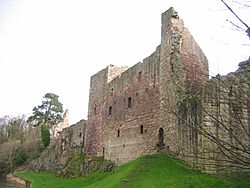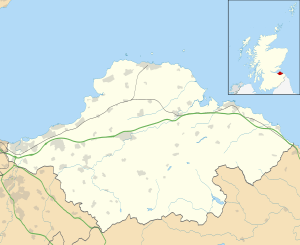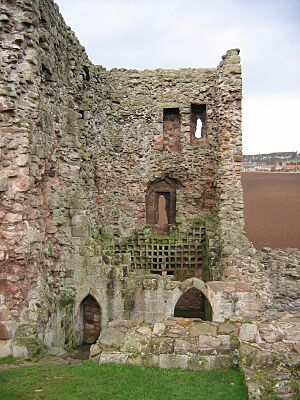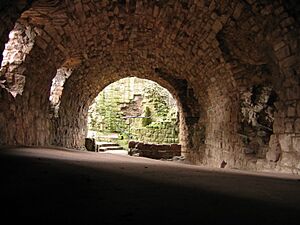Hailes Castle facts for kids
Quick facts for kids Hailes Castle |
|
|---|---|
| Near East Linton, East Lothian, Scotland |
|

North front of Hailes Castle, as seen from the River Tyne.
|
|
| Coordinates | 55°58′21″N 2°41′03″W / 55.97239°N 2.68412°W |
| Site information | |
| Owner | Historic Scotland (as Guardian) |
| Controlled by | Hepburn family (historically) |
| Condition | Ruin |
| Site history | |
| Built | 13th to 16th centuries |
| Built by | Hugo de Gourlay |
| Materials | Stone |
Hailes Castle is an old castle in Scotland. It's mostly from the 1300s. You can find it near East Linton in East Lothian. The castle sits beautifully by the River Tyne. For a long time, the powerful Hepburn family owned it.
Today, Historic Environment Scotland looks after it. It's a special historic site. You can visit Hailes Castle for free!
Contents
Who Owned Hailes Castle?
The castle was first built by Hugo de Gourlay. This happened before the year 1300. This makes it one of the oldest castles of its kind in Scotland. The Gourlay family came from Northumbria. They supported the English during the Wars of Scottish Independence. Because of this, the Scottish King took their land away.
The Hepburn Family Takes Over
Hailes Castle then went to another family from Northumbria. This was Sir Adam de Hepburn. He received the lands of Hailes from King David II. Later, in 1451, Sir Patrick Hepburn, 1st Lord Hailes, became the official Lord of Hailes. He also gained other lands. All these lands together became known as the Barony of Hailes.
Sir Patrick Hepburn made the castle much bigger. He added a huge tower on the west side. It had at least four floors. He also built a smaller tower to the east. These additions created a long building facing the River Tyne. The thick outer wall of the castle might be even older, from the 1200s.
King James IV visited Hailes Castle in 1507. He even gave money to the builders working there.
Castle Attacks and Sieges
Hailes Castle has seen many battles. In 1400, it was attacked by Harry Hotspur Percy. He was working with the Earl of March. But the castle held strong! Archibald, Master of Douglas, then led a counter-attack. He defeated the attackers.
In 1443, Archibald Dunbar successfully attacked the castle. Sadly, many people inside were killed.
The Rough Wooing War
In July 1547, during a war called the Rough Wooing, Lord Borthwick was put in charge of Hailes Castle. He promised to protect it from the "old enemies of England." He also promised not to give the castle to the Hepburn family. If the English attacked, the Scottish leader, Regent Arran, would send 24 horsemen to help.
After the battle of Pinkie, an English lord named Lord Grey of Wilton took over the castle. He said it was very beautiful inside. He also noted it was very strong. The English then put Hugh Douglas in charge.
But Regent Arran took the castle back in August 1548. He then damaged it on purpose. He removed the strong iron gates, called yetts.
Famous Visitors and Later Years
In 1567, James Hepburn, 4th Earl of Bothwell, hosted Mary, Queen of Scots, at Hailes Castle. Later, all his lands, including the castle, were taken by the Scottish Crown.
Oliver Cromwell also damaged the castle in 1650. This happened after the Battle of Dunbar.
Over time, the castle changed hands many times. It belonged to the Stewarts and the Setons. Finally, in 1700, the Dalrymple of Hailes family owned it. By the mid-1800s, the castle was used to store grain. The family had moved to a new home called Newhailes.
What Hailes Castle Looks Like
The castle stands on a piece of land sticking out into the River Tyne. This location was important. It helped control the route to Edinburgh.
The castle has a strong outer wall from the 1200s. Inside this wall is the main tower, called a keep, from the 1300s. Other buildings were added over the next two centuries.
The biggest part left today is the West Tower. It's a square tower that looks much larger than the original central tower. The central tower was probably rebuilt in the 1500s.
Some parts from the 1400s are still there. One roofless room might have been a chapel. It has signs of a small cupboard (an ambry) and a basin (a piscina). There's also a vaulted basement. This area was used as a bakehouse and brewhouse.
The original tower was later used as a dovecote. This means it housed pigeons. Only a small piece of the East Tower remains today.
 | DeHart Hubbard |
 | Wilma Rudolph |
 | Jesse Owens |
 | Jackie Joyner-Kersee |
 | Major Taylor |




